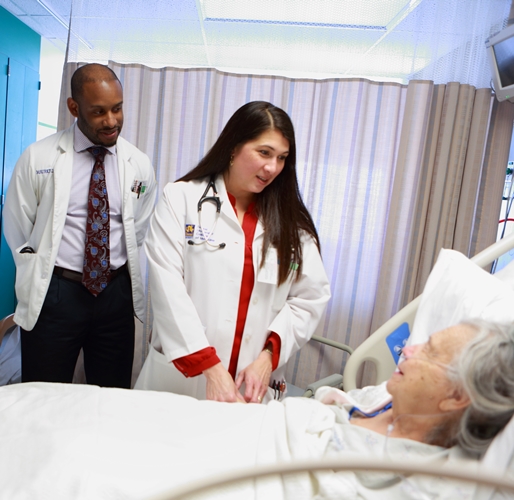
Alpha Omega Alpha, the national medical honor society, recently announced the College of Medicine’s Professionalism Formation Curriculum as the winner of its 2015 Edward D. Harris Professionalism Award.
This award recognizes outstanding faculty and programs with the best practices in medical professionalism and education.
“I am so pleased that our faculty have received this acknowledgement of their outstanding commitment and dedication to the area of professionalism formation in medicine,” said Valerie Weber, MD, vice dean for educational affairs at Drexel University College of Medicine. “Since I arrived last year, I’ve been convinced that Drexel University College of Medicine has the country’s best professionalism curriculum and this award is a powerful endorsement of the work being done here, which will be a model for other medical schools around the United States and elsewhere.”
Professional formation is the process by which medical students develop psychologically, morally and spiritually into physicians who have the capacity to provide compassionate and excellent care. The College of Medicine’s Professionalism Formation Curriculum, which includes four years of required courses and special sessions, guides students through this process.
Students are assigned to professionalism small groups at the beginning of their first year. These small groups meet throughout the curriculum and promote collaborative learning, reflective practice and social support through the transition from premedical academic environments to membership within a community of professionals. As students enter clinical environments during years three and four, the small groups utilize virtual classroom technology to hold faculty facilitated discussions that focus on personally and professionally challenging experiences.
Program leaders Steven Rosenzweig, MD, Dennis Novak, MD, and Pamela Duke, MD, oversee the curriculum’s effectiveness and sustainability, two major components reviewed by the award selection committee. 98 percent of students consistently meet professionalism objectives and competencies. For the remaining two percent, the College of Medicine initiated a formalized remediation process.
The 2015 Edward D. Harris Professionalism Award recognizes the College of Medicine’s approach to professional formation as a model for other medical schools to follow. The curriculum’s use of virtual classroom technology and its remediation process has been the subject of several national discussions, including a recent Academic Medicine article titled “How Do Medical Schools Identify and Remediate Professionalism Lapses in Medical Students? A Study of U.S. and Canadian Medical Schools.”